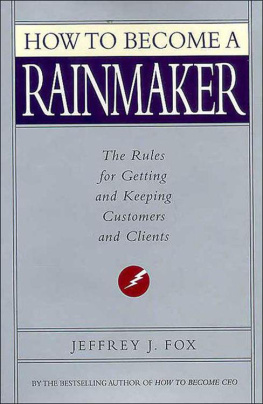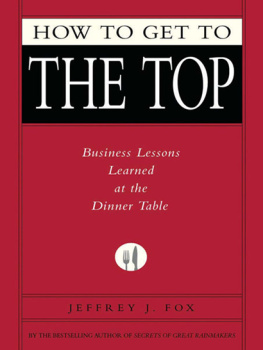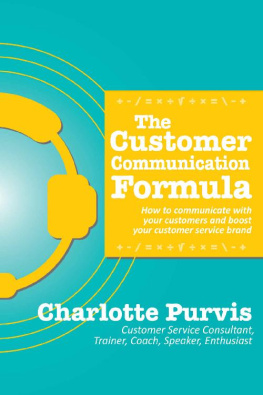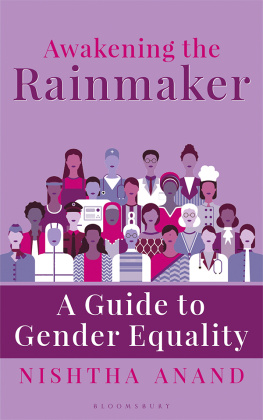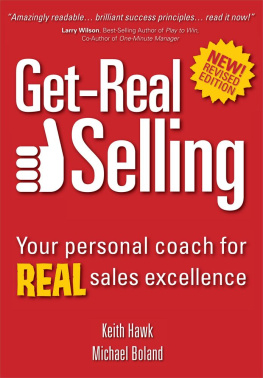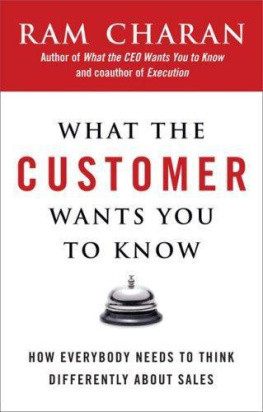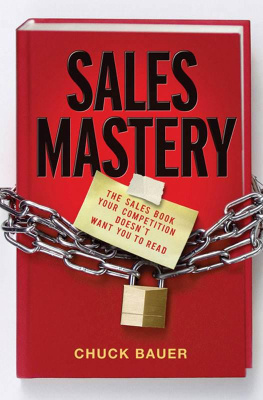HOW TO BECOME A
RAINMAKER
The Rules for Getting and Keeping Customers and Clients
JEFFREY J. FOX

Dedicated to
Catherine M. Fox
and to
Dorothy and Modesto Brunoli
Because Rainmakers sometimes need umbrellas
Contents
You Should Read This Book If Your Organization Needs Revenues
A merican Indian tradition exalts the Rain-maker. The Rainmaker used magical powers to bring the rain to nourish the crops to feed the people. Without the rain, the people would weaken, die, or have to move elsewhere.
Today, a Rainmaker is a person who brings revenue into an organization, be it profit or notfor-profit. That revenue comes from customers and donors. That revenue is the aqua viva the lifebloodof the organization. Without it the organization will die.
Customers money is the rain.
The term Rainmaker is more commonly used in such professional service industries as legal, accounting, consulting, investment banking, advertising, and architecture. In these industries, Rainmakers are the two or so people in the firm who are responsible for generating most of the new customers, the new business.
Big-hitting Rainmakers are among the highest paid employees in every company in every industry. They operate under many titles: owner, partner, chancellor, sales representative, CEO, agent, managing director, and fund-raiser. If becoming a Rainmaker is your goal, then this book will help you get there.
There is another kind of Rainmaker, and he or she is an employeeor associate or colleague or team member or crew member. Every employee must be somehow involved in the identification, attraction, getting, and keeping of customers. The advice in this book tilts to the salesperson, but if you have contact with customers, or work with and support colleagues who have contact with customers, this book will make you more effective. You will be better able to sell inside, to sell your ideas to your organization.
The most important success factor in any business or organization is having a customer. This is more important than the business idea, the products, the machinery, the buildings, the financing, or the people. It is customer money that pays everyones salary, that pays for 401(k) plans, union dues, bonuses, vacations, health insurance, computers, and office furniture. Customers are known by many names: members, students, fans, soldiers, parishioners, and patients. Regardless of what they are called, without customers no organization can continue to survive.
Therefore, the paramount job of every single employee in an organization is to, directly or indirectly, get and keep customers. This is true without exception!
The job of every employee is to help ring the cash register. The job of every employee is to keep the customers coming, and to keep the customers coming back.
This book is a recipe for how to sell, for how to make rain, be it drizzle or deluge, sprinkle or storm. If your organization needs revenues, and if you want to become invaluable to your organization, then read this book.
I
The Rainmakers Credo
- Cherish customers at all times.
- Treat customers as you would your best friend.
- Listen to customers and decipher their needs.
- Make (or give) customers what they need.
- Price your product to its dollarized value.
- Show customers the dollarized value of what they will get.
- Teach customers to want what they need.
- Make your product the way customers want it.
- Get your product to your customers when they want it.
- Give your customers a little extra, more than they expect.
- Remind customers of the dollarized value they received.
- Thank each customer sincerely and often.
- Help customers pay you, so they wont be embarrassed and go elsewhere.
- Ask to do it again.
II
Always Answer the Question, Why Should This Customer Do Business with Us?
N ever make a sales call on a customer unless you can answer the question Why should this customer do business with our company, with me? The answer must be a benefit to the customer. The answer must fit the customers agenda, not yours. The customer should do business with you because you will make him feel good, or you will solve his problem, or both. There must be a business benefit and a personal benefitoften interlinkedfor the customer. For example, a business benefit might be getting a new product to market sooner, thereby generating millions of dollars in new sales. The personal benefit might be a job promotion for the customer.
If the benefit makes the customer feel good, then, for example, the effective furnace or natural gas salespersons answer might be The customer will get warm, cozy rooms. (The ineffective furnace salesperson thinks the customer is buying BTUs.) If your product solves a problem then the answer to the question should be phrased in dollars and cents. For example, assume a software program enables a hotel to more accurately capture and bill any computer usage of hotel phone lines. If thats the case, the reason the customer should do business with you is because your product will generate $2 per room per night in incremental revenue.
The Rainmaker answers the question Why should the customer do business with us? by calculating what economic benefits the product will give the customer and by calculating the consequences to the customer of not going with the recommended product. The Rainmaker determines how the customer is benefited directly and personally.
The Rainmaker puts himself or herself in the customers shoes and answers the question If I were the customer, how would this product benefit me?
III
Obey Marketings First Commandment
T he first commandment of getting and keeping customers is to treat each customer as you would treat yourself. Do you like to be overcharged, underserved, put on endless hold, overbooked, told your room isnt ready, falsely promised, shipped late, ignored, not thanked?
Always put yourself in the shoes of the good customer. Answer the question What would I want if I were the customer? The answer is what you should strive to provide.
This is important when dealing with the upset customer. When you are the upset customer, you want a full, uninterrupted hearing, you want to deal with someone with the authority to fix the problem, and you want a fair resolution. You dont want to be sent a copy of the companys warranty policy. You dont want to be told to send another sample of your upholstery to the factory, get yet another professional couch cleaning, or be told the stains are of indeterminate nature and your claim is denied.
Remember, good customers are demanding. They may expect more from you than you believe is appropriate. What you want or how you want to be treated may not be good enough to satisfy your customers, but its a good starting place.
Deliver on your promise and youll bring rain.
IV
Customers Dont Care About You
I n the selling arena, customers dont care if you have a mortgage to pay. Customers dont care if you need their business to win a contest. Customers dont care why your shipments are late. Customers dont care what you like, where you went to school, or what sports you play or played.
The only thing customers care about are themselves and their problem. You are in front of the customer only because the customer believes, if only a little bit, that you might be able to better his or her situation.
You are there by invitation only. You must concentrate on the customer. You must be on high receive. You do not talk about yourself; rather, you ask probing, preplanned questions. You listen to what the customer says. Clarify. Summarize. Determine how you can help the customer and how your product solves the customers concern.

